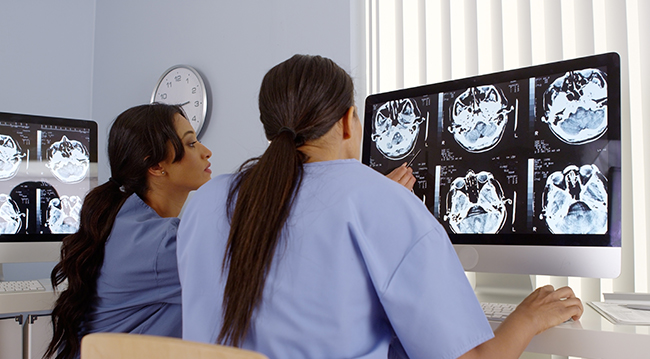Radiologic Technology

The Radiologic Technology curriculum is designed to assist students in acquiring the general and technical competencies necessary to enter the radiography profession. Radiographers use state of the art equipment to produce diagnostic medical images in a variety of health care settings.
Lee Balentine, program director
864-941-8523Credentials offered
A Career in Radiologic Technology
Radiographers use state of the art equipment to produce diagnostic medical images in a variety of health care settings. This requires an application of combined knowledge in anatomy, physics, procedures, imaging techniques and patient care.
The constant growth in the field has created new and exciting career opportunities in specialty areas. Graduates of the Radiologic Technology program qualify to sit for the American Registry of Radiologic Technology.
Special Application Requirements
The Radiologic Technology program has special program admission criteria which must be completed prior to applying for the clinical phase of the program. A student may be admitted to the college at any time in order to complete prerequisite and general education coursework.
What Will I Do as a Radiologic Technologist?
Radiologic technologists are the medical personnel who perform diagnostic imaging examinations. They are educated in anatomy, patient positioning, examination techniques, equipment protocols, radiation safety, radiation protection and basic patient care. Radiologic technologists are responsible for accurately positioning patients and ensuring that a quality diagnostic image is produced. They work closely with radiologists, the physicians who interpret medical images to either diagnose or rule out disease or injury.
Radiologic technologists might also specialize in a specific imaging technique such as bone densitometry, computed tomography, mammography, magnetic resonance imaging, or nuclear medicine. The radiologic technologists who specialize in radiation therapy, which is the delivery of high doses of radiation to treat cancer and other diseases, are radiation therapists and
medical dosimetrists.
Some Job Duties May Include:
- Adjust and maintain imaging equipment
- Precisely follow orders from physicians on what areas of the body to image
- Prepare patients for procedures, including taking a medical history and answering questions about the procedure
- Protect the patient by shielding exposed areas that do not need to be imaged
- Position the patient and the equipment in the location needed to get the correct image
- Operate the computerized equipment to take the images
Career Quick Facts
- Career Outlook
- Median Salary Average: $58,860
- SC Salary Range: $41,490-$75,350
- 94% placement rate for 2022-2023 graduates
Salary and career information from the U.S. Bureau of Labor Statistics.
- Physical Demands
- active: much standing, moving about, carrying, walking
- lifting up to 100 lbs.
- Entry Level Positions
- Radiologic Technologist
- Employers
- Abbeville Area Medical Center
- B-L Family Practice, P.A.
- Carolina Bone & Joint Clinic
- Carolina Health Centers
- Carolina Imaging Center
- Carolina Nephrology
- Doctors Care
- Edgefield County Hospital
- Express Medical Care
- Greenville Hospital System
- Greenwood Family Practice (Physicians Care Walk In Clinic)
- Greenwood Genetic Center
- Greenwood Urological
- Lakelands Orthopedic Clinic
- Laurens County Health Care (Now Prisma Health)
- Lexington Medical Center
- McCormick Correctional Institution
- McCormick Family Practice
- MD360 Convenient Care
- Mobilex USA
- Newberry County Memorial Hospital
- Palmetto Bone & Joint P.A.
- Palmetto Richland Memorial Hospital
- Providence Hospital
- Saluda Family Medicine
- Self Medical Group
- Self Regional Health Care
- St. Francis Health System
- Tower Pointe Medical Center
- United Mobile Imaging
- University Hospital
- Vista Women's Healthcare
- Ware Shoals Center for Family Medicine
Program Information
The Radiologic Technology curriculum is designed to train students to be radiography professionals, which requires an application of combined
knowledge in anatomy, physics, procedures, imaging techniques and patient care.
Graduates may also choose to pursue an advanced degree. Graduates qualify to sit for the American Registry of Radiologic Technology.
The Radiologic Technology program is accredited by the Joint Review Committee on Education in Radiologic Technology.
